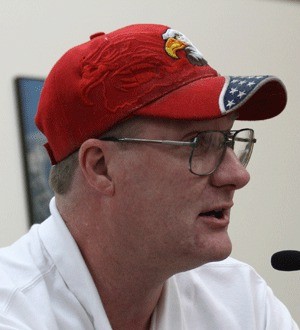There were no TV cameras and no sombreros at Oak Harbor City Hall Thursday night as the council members discussed whether to outlaw hats.
The council didn’t enact any hat-related rules, but the man behind the idea didn’t back down either.
Councilman Joel Servatius made the TV news and was the talk of talk radio in April when he made a proposal to ban the wearing of hats by citizens attending City Council meetings.
Two TV stations and a crowd of upset citizens — including some wearing cheap sombreros — descended on the April meeting at which the council was scheduled to discuss the issue, but the elected officials tabled the matter.
The maneuver worked to defuse the outrage. Only a handful of people attended the special meeting Thursday night to address the proposal, which was on the agenda with several other council motions.
Only a couple of people addressed the hat issue. Mel Vance, a former council candidate, was the only one who wore a hat, but he didn’t get a chance to discuss the topic because of the three-minute limit on comments.
Servatius explained the motivation behind the proposal. He said he was upset about previous raucous meetings at which audience people casually threw out derogatory comments. He said his motive was to promote a sense of courtesy.
“My intent was to elevate decorum, it was in no way to stifle free speech,” he said.
Likewise, Councilman Rick Almberg said he was in favor of the ban. He said the final straw for him happened during a meeting at which a number of people in the audience didn’t remove their hats for the pledge of allegiance and invocation.
“I do feel very strongly about showing respect for our flag and for our culture,” he said.
Servatius also clarified that his hat-ban idea wasn’t aimed at Vance, who commonly wears a baseball cap to meetings. He said he wouldn’t have embarrassed him that way. Instead, he said he was upset by the same hat wearers who irked Almberg. He said they were men in uniform, apparently referring to firefighters.
Servatius made a motion to ban the wearing of hats during council meetings; Almberg seconded.
The other council members, however, outvoted them. Councilwoman Beth Munns was absent.
Councilwoman Tara Hizon cited a court case and argued that it’s not a free-speech issue. Still, she was against the ban.
“I don’t care if someone wears a hat,” she said. “I would never support implementing a dress code in council chambers.”
Councilman Jim Campbell said he always removes his hat when he enters a building, but recognizes that people in other generations may not follow the same customs.
“I don’t think we should be telling people the way they should dress,” he said. “This is their building, not ours.”
Later, Campbell questioned what would happen if a woman wore a hat to cover baldness from chemotherapy.
Councilman Danny Paggao said he consulted both the Constitution and Miss Manners; he came out against the ban.
Councilman Bob Severns expressed sympathy for Servatius’ position, but said he wouldn’t want to tell people what to wear.
Grant Weed, the interim city attorney, said he hadn’t researched the issue, but spoke briefly about the laws. He pointed out that a ban could impinge on a person’s religious freedom to don headwear.
Before he was fired, former City Attorney Bill Hawkins researched the issue and concluded that a hat ban would be unconstitutional.
The ban failed on a 2-4 vote.
Almberg then motioned to ban the wearing of hats, except for religious purposes, during the pledge of allegiance and invocation. Servatius seconded the motion, but later withdrew it after it was clear other council members opposed it.
The council did, however, get other things accomplished. The members adopted Almberg’s motions to end the meetings at 9 p.m., unless extended by a vote of the council. And they agreed to end the practice of giving committee reports at the end of the meeting.
Almberg gave up on his controversial proposal to move the open public comment period to the end of the meeting. Instead, he made a motion to maintain the current comment period, but to direct the mayor to enforce the rules that limit speakers to three minutes a person and limit the entire comment period to 15 minutes.
Almberg said he was making the motion for emphasis because the mayor hasn’t done a good job of imposing the rules and several audience members have dominated the discussion.
Servatius agreed that the rules aren’t being enforced.
“I’ve been called a communist. I’ve been called a coward while sitting at the dais,” he said. “I can assure you I’m neither.”
In the end, the motion passed with Campbell abstaining.




